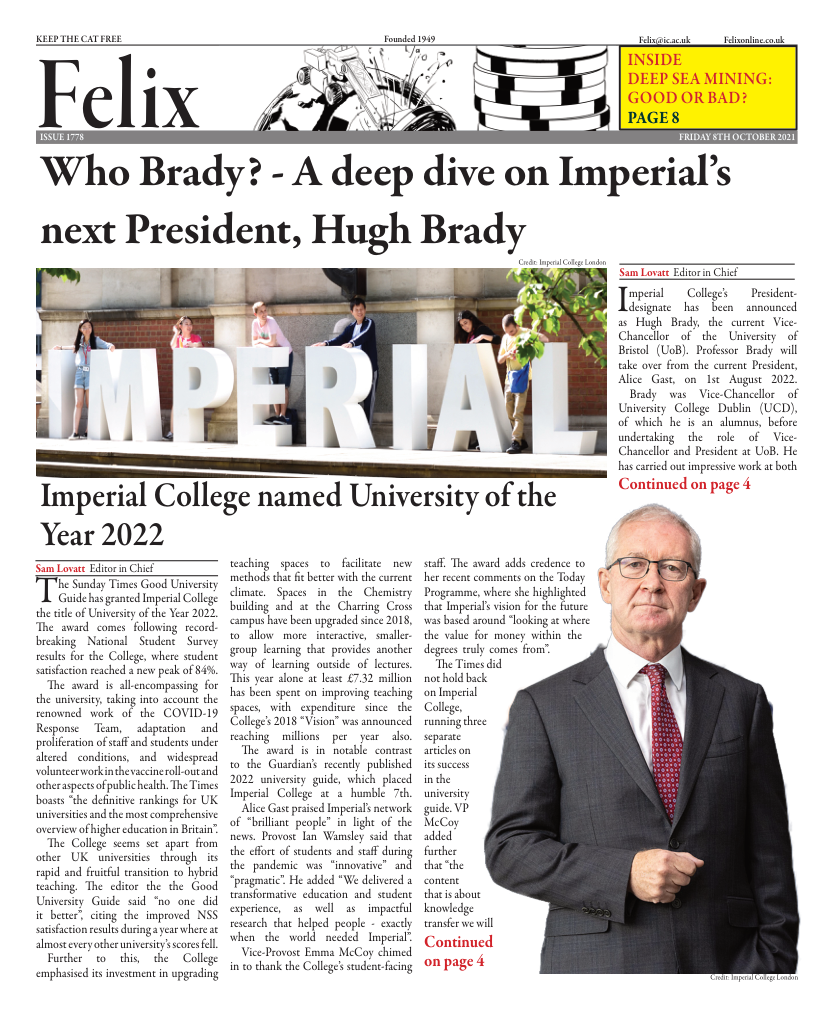Grief, student life and solitude
Juggling the heavy Imperial workload and the heavy weight of grief is hard, but I want to reassure you that it gets better.

Following months of remote and limited access, Imperial’s student body is tentatively returning to campus learning and this is positive news for almost everyone I know, including me. In fact, I have found myself missing mundane things like the commute, or the lecture theatre that I hated not so long ago. My memories of student life before the lockdowns are now wrapped in the warm fog of nostalgia, which is confusing because prior to lockdown one I was in the worst place mentally that I had ever been.
I lost my father halfway through my first year, and for over a year I was unable to get myself into a positive place until the first lockdown put my chaotic student life on pause. I was so relieved when I learnt I could go home since I didn’t need to put up a façade when I was with my family.
My experience will likely be a familiar one for some students. Unfortunately, the COVID-19 pandemic has been claiming lives since 2019. For some students who are grieving, the social distancing rules meant they didn’t get to say goodbye properly. Additionally, given the social isolation during the lockdowns, there may be students who are entering a social environment that may become overwhelming.
The best piece of advice I have for any student who is dealing with grief, is to reach out and look for help. I used to think that phrase was too generic and vague to mean anything useful, but grief is not an experience you can prepare for. It affects people in different ways, and you may not understand what you are going through until you find help.
I can’t take back time and I often wish I handled things differently, but I can share my experience with grief to hopefully help anyone out there feel less alone or confused.
If I had accepted that I was grieving, I could’ve recognised and dealt with the stages of grief appropriately.
My dad passed away with no warning beforehand, one day he was alive and the next day he didn’t turn up to work. My parents were separated, and I hadn’t seen him for a while, so his death was almost unreal to me. That continues to be the most painful part for me; my dad slipped quietly from this world to whatever lies beyond without saying goodbye
After his funeral I tried to jump back into my routine as if nothing had happened. My busy schedule on campus also meant I couldn’t stay at home for long, so I returned to London days after his funeral and rarely went back home for the rest of first year.
My dad, a former flight engineer, always stressed the importance of education to me, and I wanted nothing more than his approval when I got my acceptance letter into Imperial. So, I told myself that I would bounce back, I believed that I would be inspired to work hard and do exceptionally well in my degree to honour my dad.
Now, that approach may have worked if it was my origin story in a Marvel movie, but I am a complex human being in the real world so I very quickly lost control of everything. I isolated myself from my home friends, none of whom knew about my dad’s death because I didn’t know how to bring it up. I hid my emotional distress from my new friends; I told only a handful of them and reassured them that I was perfectly fine, that I had cried all my tears at his funeral. Really, I just wanted to be a normal fresher like everyone else, not the ‘fresher whose dad just died’. At parties, I relied on alcohol to relax but when that stopped being effective, I just pushed people away and started leaving events early to be alone. In my seclusion I could finally relax, or cry. Eventually, I skipped tutorials and lectures because I felt ashamed of how behind I was. I felt embarrassed by how unorganised and stupid I must have looked to my peers, but I didn’t want pity, so I accepted the judgement. I had just enough energy to focus on revision for the subjects I liked but I gave up on the others as I was certain that I would be kicked out of Imperial after my exams anyway.
At the end of my first year, I couldn’t recognise myself. I had worked so hard to get into this university, I had good friends, and supportive family and yet I wanted to just disappear. Despite the emotional whirlpool I was in, I thought I could fix things alone and I refused to accept that I was where I was because of grief. I rationalised that I had no right to still be upset months after my dad’s death, so much so that I didn’t apply for mitigating circumstances for my exams.
When I returned home that summer, a shell of my former self, I crashed instantly. All I did was sleep, eat, and watch Netflix. Honestly I don’t remember much from that summer; I was simply in a deep hole and my confusion as to how I got there was the dominant emotion.
During my second year, I was fortunate to receive some free counselling through the College’s Counselling Service, this was before the first lockdown. Although it took that lockdown for me to see progress, it was my Counsellor who helped me to understand that my feelings weren’t irrational. Instead, the pressure I put on myself to succeed was. They helped me to recognise the harm I had done in trying to bury the reality that my dad had died. If I had accepted that I was grieving, I could’ve recognised and dealt with the stages of grief appropriately. I could’ve asked my department for more help and advice – I only realised later that I could’ve taken a year out. Maybe my friends wouldn’t have been so confused by my sudden behavioural changes, and maybe I would’ve spoken to my family more about how hard I was finding everything.
I did find peace in the isolation, hence once I stepped back into social situations with other students I started to panic. I could feel myself regressing but I was able to push through by journaling, sightseeing, walking, painting, music, podcasts, and talking to my close family and friends – I was finally able to accept my emotions and be kind to myself.
I can’t take back the time I lost to grief, stress, fear, and anxiety. I can only look forward and try to learn from what I went through. When I slowly approached my loved ones again, I was consistently humbled by how forgiving people were to me despite my stubborn introversion. I had spent so much time in my head that I was certain they hated me, but they forgave me and accepted me. Most importantly though, I eventually forgave myself.
I’m still not where I want to be, but I am very proud of how far I have come. There was a point in time where I couldn’t talk about my dad without crying, and now I’m writing an article about grief.
So, as cliché as it may sound, time really does heal wounds.
I have shared links to helpful sites below for anyone who may relate to the content of this article:
https://www.imperial.ac.uk/student-support-zone/support-during-covid-19/coping-with-grief-and-loss/
https://studentspace.org.uk/wellbeing/looking-after-your-wellbeing-while-grieving
https://studentspace.org.uk/wellbeing/process-of-grief
https://www.theguardian.com/education/mortarboard/2014/may/30/deal-with-grief-university
https://www.theguardian.com/education/mortarboard/2014/apr/11/university-students-dealing-with-death
https://studenthut.com/articles/how-cope-grief-university
https://www.topuniversities.com/blog/how-cope-death-loved-one-university
https://www.mentalhealth.org.uk/coronavirus/change-loss-and-bereavement
https://www.cedars-sinai.org/blog/coping-with-loss-and-grief-during-covid-19.html








